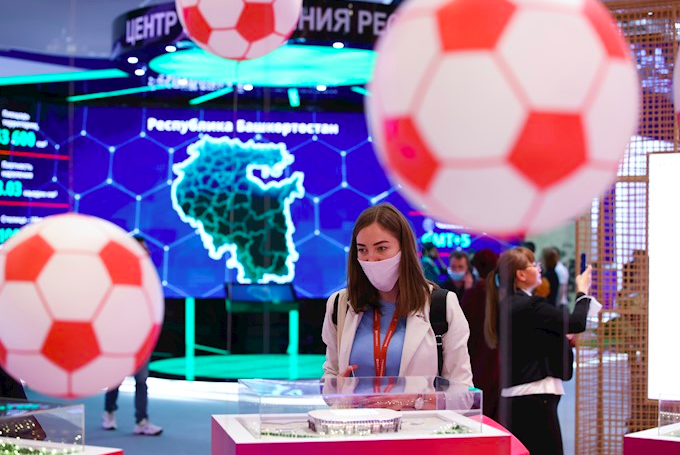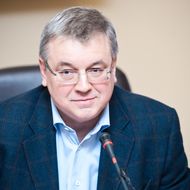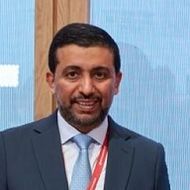HSE University to Expand Scientific and Educational Cooperation with Two Universities in Qatar

At the St Petersburg International Economic Forum (SPIEF), HSE University signed Memoranda of Understanding with the University of Qatar and Hamad Bin Khalifa University. The agreements aim to strengthen the scientific potential of the universities and develop projects in teaching and research. In addition, HSE representatives took part in expert discussions at the Qatar National Pavilion at SPIEF.
The official ceremonies took place on June 5 at the Qatar National Pavilion at the St Petersburg International Economic Forum (SPIEF). Yaroslav Kuzminov, HSE University Rector, and Hassan Al-Derham, President of Qatar University, signed a memorandum of understanding. The parties plan to strengthen and develop research and academic opportunities as part of the cooperation between the Qatar University College of Law and HSE University’s Faculty of Law.
Addressing the audience, Yaroslav Kuzminov noted that the universities began their cooperation more than five years ago with academic contacts between scholars from the Social and Economic Survey Research Institute at Qatar University and HSE University’s Laboratory for Comparative Social Research. Students of HSE University’s School of Asian Studies have repeatedly won the Annual All-Russian Arabic Language Competition, Doha Prize, and been awarded grants to study Arabic at the University of Qatar.
The HSE Rector also noted that a new field of cooperation is evolving: law. Islamic law plays an increasingly important role internationally, and the HSE Faculty of Law already has certain experience and expertise in this area and offers a Master’s programme in Islamic Law. The cooperation in law will also involve research and analytical projects led by the HSE-Skolkovo Institute of Law and Development.

Yaroslav Kuzminov
The cooperation will enable students to study and understand the legal systems — the Russian and the Islamic ones — from a comparative legal perspective and to learn about the life and culture of the partner country by participating in mobility programmes and academic events. Areas of cooperation also include academic exchanges between teachers, the development and implementation of joint educational programmes in various branches of law, and new formats for student projects.
The upcoming initiatives include cooperation in the areas of legal clinic operation, comparative law, and digital law, which involves big data and artificial intelligence. The HSE Rector also mentioned that 40 HSE University students helped the forum participants as volunteers, including those at Qatar National Pavilion.
Hassan Al-Derham, in turn, said that for many years, Qatar University has developed cooperation with universities in North America and Western Europe, but now it is high time to expand the network of contacts.

Hassan Al-Derham
I believe that as part of this cooperation, we will learn a lot from each other and, as Mr. Rector has said, Qatar University and HSE University have already successfully implemented a few joint projects. I’m confident that in the near future, we are going to expand the scope of our cooperation to include the social sciences, humanities, economics, law, as well as student exchange and joint events.
Ivan Prostakov, HSE University Vice Rector, and Michael Benedik, Vice Rector of Hamad Bin Khalifa University, signed a memorandum of understanding aimed at developing possible joint projects and activities in the sphere of education and research by the College of Islamic Studies and HSE — Skolkovo Institute of Law and Development at the HSE University’s Faculty of Law.
The main areas of cooperation include food security and Islamic finance and investments: Qatar is one of the leaders in the region in the field of food security. At the same time, these areas of cooperation reflect the main objectives of the HSE — Skolkovo Institute's ‘Agrofinmost’ project from 2019. These and other prerequisites constitute an important basis for developing research cooperation, in particular for conducting applied research in collaboration and with the support of companies from the real sector.
On the last day of SPIEF, several sessions with HSE University representatives took place at the Qatar National Pavilion. Isak Froumin, Academic Supervisor of the HSE Institute of Education, moderated the discussion, ‘New Types of Funding and Partnerships in Education’, and Ivan Prostakov spoke at the business breakfast, ‘Modern University between Global Challenges and Local Tasks: Life after the Pandemic’.

Vice Rector Prostakov spoke about HSE University’s experience with the pandemic, as well as about student grade inflation over recent years. He noted that the University had started developing forms of remote learning long before the pandemic and is going to continue using them. Digitalization helps a lot in this regard, as it facilitates virtual mobility. Of course, it can’t replace conventional mobility completely, but it provides some new opportunities, the Vice Rector emphasized. Today, the University is building a hybrid approach that combines online and on-site forms of education. He said that almost half of HSE’s international students are studying online from their home countries. But some of them have problems with the quality of their internet connection.
The signing of the memoranda was followed by the closing ceremony of the Qatar pavilion in the presence of St. Petersburg Governor Alexander Beglov and Qatar’s Ambassador to Russia Sheikh Ahmed bin Nasser bin Jassim Al Thani at which Sergey Kadochnikov, Director of HSE Campus in St. Petersburg, received a certificate of participation in the ‘Legacy’ Project of Qatari — Russian Centre for Cooperation. As part of this project, a number of interior items and decorative elements of the Qatar pavilion are planned to be donated to equip the ‘Qatar Corner’ in HSE University’s building on the Griboyedov Canal Embankment, which will become a recreational space for students and staff.

